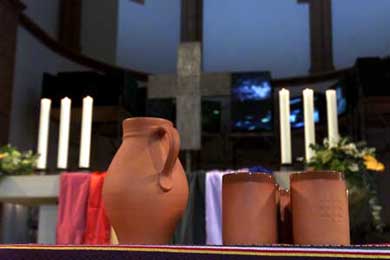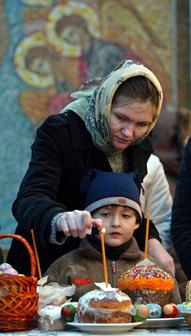|










|
|
- «Why does your master
eat with the sinners?»
- (Mathew 9, 11)
If we want to think thoroughly about the Eucharist, above
all, we perceive how we are, believers or non-believers, made
to help each other, to share with each other, how we are called
for a communion. As a basic food, the bread is broken to be shared.
All the different kinds of human skills begin to make sense when
they are shared.
-
 |
The Eucharist banquet is a preview of the festivities in Heaven
to which, all of us, good or bad, we are asked to attend (Mat.
22). It is not a question of being fit or not for this invitation,
but of answering positively with confidence. Truly Mathew requests
from the guests of the king to be dressed adequately, when Luke,
chap. 16, speaking of the same invitation, does not mention that
at all. Mathew's request could also be a moral disposition: the
necessary confidence required to plainly participate to the festivities
of the Kingdom.
There is no filter, no reason to ask ourselves if we are worthy
or not to accept the invitation of the master. Jesus never took
notice of the moral qualities of the persons to whom he was speaking,
-
 |
|
«He eats with the sinners» as it is
said. |
-
- Probably the only thing is to accept willingly the invitation,
our own hierarchical classifications do not count in regard to
the feeling to be in agreement, not because we are better, but
because we feel, at the bottom of our heart, that we depend of
the creating love of God.
Beyond our limits and our weaknesses, it is the entire benevolence
of God's invitation that matters. This call for communion felt
by all humans is in reality a vital sense of solidarity and love
given by God to every body.
During the Last Supper with his disciples, Jesus broke and gave
first the bread, as a way to express that his life is offered,
broken like the bread, in union with all. As if the sign of shared
bread was not enough, at the end of the meal, as a last message,
Jesus took a cup of wine and gave it to them as a sign of Alliance
between God and us. We are of the same blood; it is the life
of God Himself that gives life to us.
-

|
Consequently, to participate to the formation of a world of
solidarity, of justice and of love is not only a human work but
in the mean time it is the work of God in us and through us.
The ultimate message of Jesus at the Last Supper is a call for
unity in order to build fraternity where we are. « Do this
in memory of me" that is to say, » bring sharing and
peace, you are a carrier of the presence of God". |
A community that generates communion is aware of and celebrates
the presence of Jesus, both Christ and son of man. It does it
everywhere there is dialogue, solidarity and fraternity. Then
spontaneously we say, together, only these two words: «Our
Father».
|
